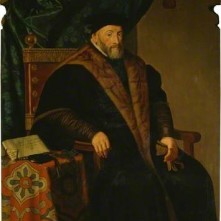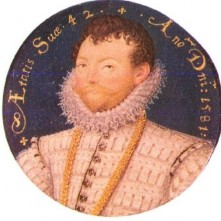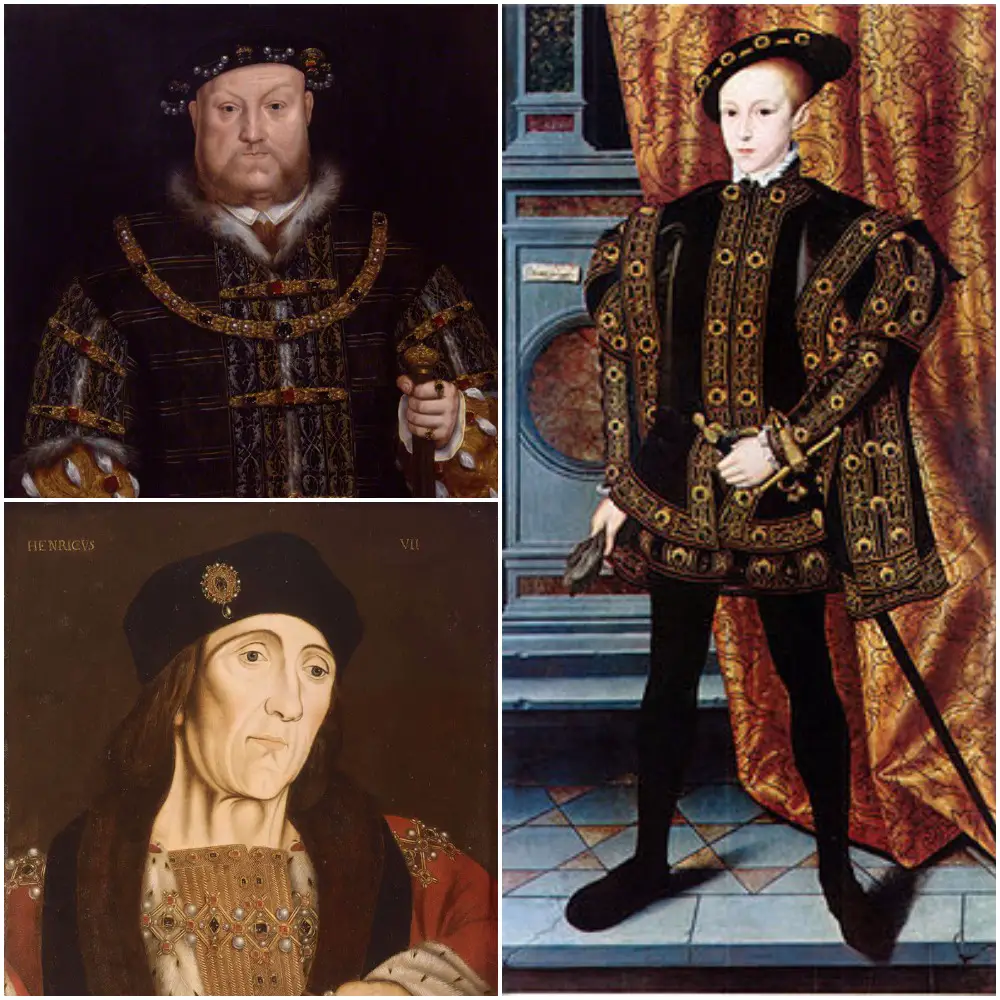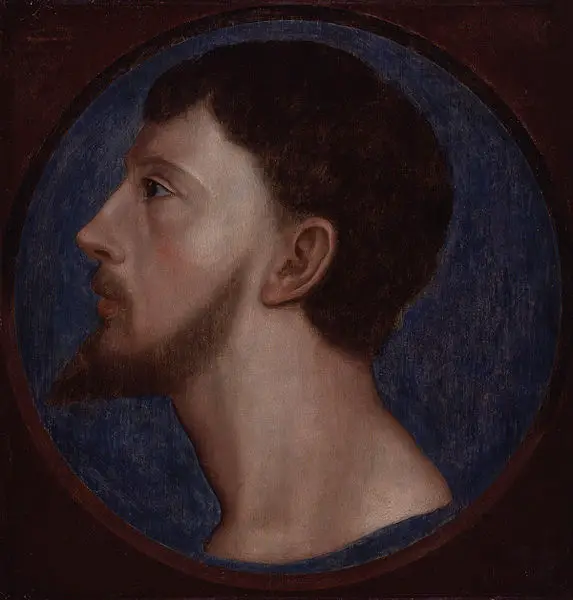23 January
1516 – Death of Ferdinand II of Aragon in Madrigalejo, Extremadura. He was laid to rest in la Capilla Real, the Royal Chapel of Granada. Ferdinand was the husband of Isabella I of Castile and the father of Catherine of Aragon, Henry VIII's first wife. Ferdinand was succeeded by his daughter, Juana (Joanna), who ruled jointly with her son, Charles, who became King Charles I of Spain.
1540 – Birth of Thomas Egerton, 1st Viscount Brackley and Lord Chancellor to James I. Egerton was the illegitimate son of Sir Richard Egerton, a landowner from Cheshire, by a servant girl.
1552 – Parliament met to discuss the revision of the 1549 “Book of Common Prayer”.
1554 – Baptism of Richard Edes, Dean of Worcester, at Newport on the Isle of Wight. He became Dean of Worcester in June 1597. Edes was also Chaplain and Court Preacher to Elizabeth I and James I.
1570 – Assassination of James Stewart, 1st Earl of Moray, illegitimate son of James V and Regent for James VI between 1567 and 1570. He was shot in Linlithgow by assassin James Hamilton of Bothwellhaugh. The hit was ordered by the Hamilton family, supporters of Mary, Queen of Scots.
1571 – Official opening of the Royal Exchange in London by Queen Elizabeth I. It had been founded in 1565 by mercer and merchant, Sir Thomas Gresham.
1576 – Death of James Pilkington, Bishop of Durham. He was buried at the church of St Andrew, Bishop Aucklan, but then moved later that year to Durham Cathedral.
1584 – Death of John Watson, Bishop of Winchester, in Winchester. He was buried in Winchester Cathedral.
1600 – Death of John Case, writer and philosopher. He was buried in the chapel of St John's College, Oxford. Case is known for his commentaries on the works of Aristotle.
1620 – Death of Sir John Croke, Judge and Speaker of the House of Commons, in Holborn, London. He was buried at Chilton, Buckinghamshire. He was elected as Speaker of the House of Commons in October 1601.
24 January
1502 – Henry VII ratified a peace treaty, the Treaty of Perpetual Peace, with James IV of Scotland. Part of this treaty was the agreement of a marriage between Henry VII's daughter, Margaret, and James.
1503 – The foundation stone of King Henry VII's chapel was laid at Westminster Abbey.
1536 - The forty-four year-old King Henry VIII had a serious jousting accident at Greenwich Palace.
1555 – A great joust was held at Westminster between English and the Spanish knights – “grett ronnying at the tylt at Westmynster, with spayrer, boyth Englys men and Spaneards”.
1566 – Death of Rowland Meyrick, Bishop of Bangor. He was buried at Bangor Cathedral.
1597 – Death of Thomas Molyneux, Elizabeth I's Chancellor of the Court of Exchequer, and Receiver of Customs and Imposts on Wines, in Dublin. He was buried in Dublin's Christ Church Cathedral.
1634 – Death of Nathaniel Giles, composer, Organist and Choir master at St George's Chapel, Windsor and the Chapel Royal. He was Choir Master at Windsor for forty-nine year. A memorial tablet to him can be found on the floor of Rutland Chapel in St George's Chapel.
25 January
1533 - Henry VIII secretly married Anne Boleyn at Whitehall. Click here to read my article about their wedding over at The Anne Boleyn Files.
1540 – Birth of Edmund Campion, Jesuit and martyr St Edmund Campion, in London. He was hanged, drawn and quartered on 1st December 1581 for treasonable conspiracy. Campion was beatified in 1886 by Pope Leo XIII and canonized in 1970 by Pope Paul VI.
1554 – Thomas Wyatt the Younger raised his standard in Maidstone, and other rebels in Kent made simultaneous proclamations in Rochester, Tonbridge, Malling, and Milton. Click here to read more about Wyatt's Rebellion.
1559 – Elizabeth I's first Parliament was inaugurated.
1567 – Death of Sir William Hewett, Lord Mayor of London from 1st September 1559.
1586 – Robert Dudley accepted the title of Governor-General of the Netherlands.
26 January
1528 – Death of Sir Francis Poyntz, courtier and diplomat, in London. He died of the plague. He was made an Esquire of the Body to Henry VIII in 1516, and then a Carver in 1521. Poyntz carried out a diplomatic mission in 1527, when Henry VIII sent him to the Holy Roman Emperor, Charles V, to help negotiate peace between Charles and Francis I of France.
1533 – Henry VIII appointed Thomas Audley as Lord Chancellor to replace Sir Thomas More, who had resigned the previous year. Audley had actually been carrying out the duties of Lord Chancellor since May 1532.
1546 – Death of Sir John Spelman, Judge of Assize and Law Reporter. He was buried at Narborough, Norfolk. He is known for his reports of cases from 1502 to 1540, which included the proceedings against Cardinal Wolsey, Bishop Fisher, Sir Thomas More and Anne Boleyn.
1554 – Mary I wrote to Elizabeth I summoning her to court and warning her about Wyatt's Rebellion. Elizabeth did not obey the summons, pleading illness as an excuse. Click here to read more.
1567 – Death of Nicholas Wotton, diplomat, Secretary of State and Dean of Canterbury and York. He died in London and was buried in Canterbury Cathedral.
1612 – Burial of Jane Suárez de Figueroa (née Dormer), Duchess of Feria, at Zafra, in the monastery of Santa Clara.
27 January
1501 – Death of Thomas Langton, Bishop of Winchester and Archbishop-elect of Canterbury, from the plague. He had been elected Archbishop on 22nd January, but died before his consecration. He was buried at Winchester Cathedral, in the chantry chapel.
1510 – Death of Sir Thomas Brandon, soldier, courtier and diplomat. He was buried at the London Blackfriars on 29th January. Brandon served Henry VII as Master of the Horse and Henry VIII as Warden and Chief Justice of the Royal Forests to the south of Trent.
1541 – The parsonage, lands and right to appoint clergy in Haverhill, Suffolk, were granted to Anne of Cleves. Her marriage to Henry VIII had been annulled in the previous July.
1548 – Archbishop Thomas Cranmer wrote to Bishop Bonner informing him that the Lord Protector had decided “that no candles should be borne upon Candlemas Day, nor also from henceforth ashes or palms used any longer.”
1550 – Execution of Humphrey Arundell, rebel, at Tyburn. He was hanged as a traitor after leading the rebel forces in the Cornish Prayer Book Rebellion of 1549.
1556 – Execution of Bartholomew Green, Protestant martyr, at Smithfield, with six other Protestants. Green was a zealous evangelical and also appears to have been behind the circulation of a bill denouncing Philip of Spain and Mary I, and supporting Elizabeth.
1596 - Sir Francis Drake, explorer, sea captain and pirate, died of dysentery in Portobelo harbour, Panama. When he realised that death was near, he asked to be dressed in his armour. Although he requested burial on land, Drake was buried at sea in a lead coffin, along with his second cousin, Admiral Sir John Hawkins. Click here to read more.
1606 – The Trial of the eight surviving conspirators of the Gunpowder Plot, including Guy Fawkes, began in Westminster Hall. They were found guilty of treason and sentenced to be hanged, drawn and quartered. Some were executed on 30th January, but Guy Fawkes met his end on the 31st.
28 January
1457 - Henry VII, or Henry Tudor, was born at Pembroke Castle in Wales. His parents were Edmund Tudor, 1st Earl of Richmond and son of Owen Tudor and Catherine of Valois, and his thirteen year-old wife, Margaret Beaufort, great-granddaughter of John of Gaunt, 1st Duke of Lancaster, and his mistress (and later wife) Katherine Swynford. It was through this Beaufort side going back to John of Gaunt that Henry VII derived his claim to the throne of England, and he became King after defeating Richard III and his troops at the Battle of Bosworth on 22nd August 1485. He ruled for over 23 years.
1501 – Death of John Dynham, 1st Baron Dynham, politician and administrator, at Lambeth. He was buried at the London Greyfriars on 30th January. His offices included Lord High Treasurer of England, Lord Chancellor of Ireland, Lieutenant of Calais and High Sheriff of Devon.
1521 – Opening of the Diet of Worms, which ran from 28th January to 25th May 1521 with Charles V, Holy Roman Emperor, presiding over it. Reformist Martin Luther was summoned to the imperial diet to renounce or reaffirm his beliefs, and he appeared there on 16th April. On 25th May 1521, the Edict of Worms was issued by the Emperor denouncing Luther and calling for him to be punished as a heretic. It offered a reward to anyone who could capture him.
1547 - Death of Henry VIII at Whitehall. His doctors were afraid to tell the King that the end was near, for fear that they’d be accused of treason, so Henry's good friend Sir Anthony Denny broke the news to the King. Henry asked for Archbishop Cranmer and then slept for a few hours. By the time Cranmer arrived, the King was unable to speak, but when the Archbishop asked him to give a sign that he trusted in God, the King was able to squeeze his hand. He lapsed into unconsciousness and died in the early hours. He had been King for over thirty-seven years.
1598 – Death of Edward Barton, diplomat and Elizabeth I's ambassador to the Ottoman Empire, of dysentery on the island of Heybeli Ada, in the Sea of Marmara, off the coast of Istanbul. He was buried on the island in the Christian cemetery.
29 January
1536 - Catherine of Aragon was laid to rest in Peterborough Abbey, now Peterborough Cathedral. She had requested that she should be buried in a Chapel of her beloved order, The Observant Friars, but Henry’s dissolution of the monasteries meant that there were none left. She was buried as Dowager Princess of Wales, not queen.
1547 – Edward Seymour and Anthony Denny informed the young Edward VI that his father, Henry VIII, had died the day before.
1559 – Death of Sir Thomas Pope, founder of Trinity College, Oxford, member of Parliament and Privy Councillor in Mary I's reign, at Clerkenwell. He was buried at St Stephen's Church, Walbrook. In 1556, Pope acted as a guardian for Princess Elizabeth at Hatfield House, and handled the correspondence when Eric of Sweden was interested in marrying Elizabeth.
1577 – Death of Richard Harpur, Law Reporter and Judge of the Common Pleas. He was buried at Swarkestone Church in Derbyshire.
1613 – Death of Sir Thomas Bodley, scholar, diplomat and founder of Oxford's Bodleian Library at his house next to St Bartholomew's Hospital in London. He was buried in Merton College chapel on 29th March.










Leave a Reply